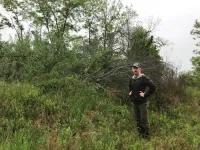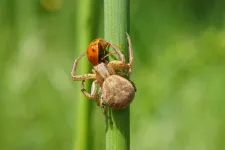(Press-News.org) Almost a ubiquitous presence in landscapes across Southwest Virginia, the invasive autumn olive thrives.
But it’s not supposed to be here.
Autumn olive is known for its nitrogen-fixing ability, allowing it to thrive in poor soils and outcompete native plants. The shrub’s berries are edible, rich in antioxidants such as lycopene, and have a tart-sweet flavor. While its berries are beneficial for wildlife, the plant's aggressive spread disrupts local ecosystems, reducing biodiversity.
With a one-year grant from the Powell River Project, located in Wise County, Virginia, Virginia Tech researchers are studying a native fungus that potentially could kill the autumn olive with minimal human interaction.
To remove the autumn olive currently, the plant needs to have its underground root system removed in addition to the destruction of the plant itself. This fungus could make this process much easier.
“What we’re doing is the first step to confirm what’s actually happening to the autumn olives with this fungus,” said Carrie Fearer, the project lead and assistant professor in the College of Natural Resources and Environment. “What we’re doing is called Koch’s Postulates, which is proving the pathogenicity of the fungus.”
A few months ago, Sara Klopf, a research associate and co-principal investigator on the project, saw declining autumn olive with symptoms of cankers along the Powell River. There are no known pathogens that target the autumn olive. Depending on the outcome of the testing of the fungus, the researchers hope that this could lead to a biocontrol method for the invasive plant.
The other aspect of the grant is to map the extent of the symptoms of the autumn olive along the Powell River.
This project is a collaboration across Virginia Tech, including Jacob Barney and Pat Donovan of the College of Agriculture and Life Sciences, Daniel Putnam, a graduate research assistant in the College of Natural Resources and Environment, and Chris Fields-Johnson ’08, M.S. ’11, Ph.D. ’16 with the Davy Tree Institute.
END
Researchers receive grant to study invasive autumn olive
2024-10-23
ELSE PRESS RELEASES FROM THIS DATE:
New research shows urine tests may detect early diseases
2024-10-23
Early detection is critical when it comes to curing diseases like cancer, but not everyone has easy access to screening tools. For problems in the genitourinary (GU) tract (which includes the kidneys, prostate, and bladder), health providers usually use a combination of screening tools, including blood tests, imaging, and physical examinations. Scientists are now working on an even simpler tool for screening illnesses before they become a problem – urine analysis.
According to a new study from scientists at The University of Texas at Arlington, Chan-Zuckerberg Biohub, and Stanford University, ...
Antibiotics and antifungals may slightly affect Parkinson's risk, study finds
2024-10-23
A Rutgers Health study has found that people who took multiple courses of penicillin antibiotics had a modestly lower risk of developing Parkinson's disease, a surprising finding that researchers say highlights the complex relationship between bacteria in the digestive tract and brain health.
The study, published in Parkinsonism & Related Disorders, analyzed medical records from more than 93,000 people in the United Kingdom. Researchers found that those who received five or more courses of penicillin antibiotics in the five years before diagnosis had about a 15% lower risk of Parkinson's compared with those ...
Nixing narcolepsy nightmares
2024-10-23
Nightmares affect 30-40% of patients with narcolepsy, but are often overlooked
Treatment can transform patients’ sleep and their daytime mood in a matter of weeks
Study found overall reduction in nightmare severity and frequency in six patients
CHICAGO --- A new Northwestern Medicine study has demonstrated a new way to treat narcolepsy-related nightmares.
The scientists combined cognitive behavioral therapy (CBT) and lucid dreaming to help patients in a small clinical trial.
“We had them imagine what they’d like to dream instead of their nightmare, almost like they’re writing a movie script,” said corresponding author ...
Mass General Brigham selected to receive $3.29 million award from ARPA-H’s Sprint for Women’s Health
2024-10-23
Mass General Brigham has been selected by the Advanced Research Projects Agency for Health (ARPA-H) as an awardee of the Sprint for Women’s Health to address critical unmet challenges in women’s health, champion transformative innovations, and tackle health conditions that uniquely or disproportionately affect women. Mass General Brigham will receive $3.29 million in funding over two years through the Sprint for Women’s Health spark track for early-stage research efforts.
Understanding and improving sleep is especially important for women, who face a higher risk of neurodegenerative diseases ...
The decision to eat may come down to these three neurons
2024-10-23
Speaking, singing, coughing, laughing, yelling, yawning, chewing—we use our jaws for many purposes. Each action requires a complex coordination of muscles whose activity is managed by neurons in the brain.
But it turns out that the neural circuit behind the jaw movement most essential to survival—eating—is surprisingly simple, as researchers from Rockefeller University recently described in a new paper in Nature. Christin Kosse and other scientists from the Laboratory of Molecular Genetics, headed by Jeffrey M. Friedman, have identified a three-neuron circuit that connects a hunger-signaling hormone to the jaw movements of chewing. ...
Woods Hole Oceanographic Institution researchers use the sounds of healthy coral reefs to encourage growth of a new species of coral larvae
2024-10-23
Woods Hole, Mass. – Coral reefs worldwide are in trouble. These ecosystems support a billion people and more than a quarter of marine species. Still, many have been damaged by unsustainable fishing and tourism, coastal construction, nutrient runoff, and climate change. Now, researchers have shown that broadcasting the sounds of healthy reefs is a way to encourage larval corals to repopulate degraded sites and help revitalize them.
A recent study done by researchers at the Woods Hole Oceanographic Institution (WHOI) showed that golfball coral larvae can be encouraged to settle when they hear the sounds of a vibrant, healthy reef. This is the second coral species ...
Researchers at NYU Tandon School of Engineering and KAIST develop method to 'hear' defects in promising nanomaterial
2024-10-23
An international research team led by NYU Tandon School of Engineering and KAIST (Korea Advanced Institute of Science and Technology) has pioneered a new technique to identify and characterize atomic-scale defects in hexagonal boron nitride (hBN), a two-dimensional (2D) material often dubbed "white graphene" for its remarkable properties.
This advance could accelerate the development of next-generation electronics and quantum technologies.
The team reported that it was able to detect the presence of individual carbon atoms replacing boron atoms in hBN crystals. This discovery was made possible by listening to ...
Biodiversity increases nutrient availability
2024-10-23
Animals not only need sufficient calories to function, but also essential nutrients — including omega-3 and omega-6 polyunsaturated fatty acids (PUFA). Insects and arachnids are an important source of these essential fatty acids for birds, hedgehogs, lizards and the like. However, the content depends on the specific types of insects and spiders consumed. Aquatic insects, such as caddisflies or dragonflies, contain significantly more omega-3 long-chain (LC) PUFA than terrestrial insects because omega-3- LC-PUFA rich algae form the base of the food chain in aquatic ecosystems.
The ...
American Society of Anesthesiologists names Donald E. Arnold, M.D., FACHE, FASA, new president
2024-10-23
PHILADELPHIA — Donald E. Arnold, M.D., FACHE, FASA, chair of the Department of Anesthesiology, Mercy Hospital in St. Louis and member of the board of directors of Western Anesthesiology Associates, Inc., in Ballwin, Missouri, was today named president of the American Society of Anesthesiologists (ASA), the nation’s largest organization of anesthesiologists. Dr. Arnold assumed office at the ANESTHESIOLOGY® 2024 annual meeting and will serve for one year.
“I’m honored to be named president of ASA and committed to serving our members, supporting the Society’s mission to advance the specialty, preserving physician-led anesthesia care, and above ...
Family as a wealth factor
2024-10-23
Wealth is one of the strongest indicators of social status, acting as a key indicator of social inequality and influencing access to education, health care and professional success. In a study, researchers from the Max Planck Institute for Demographic Research, the University of Cologne, GESIS and the Norwegian Institute of Public Health examined how financial wealth changes related to various generational transitions within families. The study used data from Norwegian registries and focused on people born in 1953.
Investigating changes in wealth within the ...




